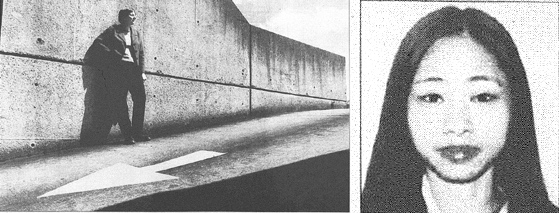This article appeared in The Australian 15 March 2003 p5

Death exposes
agony of sex slaves
WHEN Puangthong Simaplee, affectionately known to friends as Popo, was picked up in a raid on a brothel in Sydney's Surry Hills, the tiny, emaciated 27-old-year had endured years of abuse and indignity. Sold as a child and trafficked to Australia on a fake Malaysian passport at the age of 12, she was enslaved as a prostitute. The girl from a hill tribe in Thailand's Chiang Mai province was addicted to heroin by the time Immigration Department officers raided the brothel at 359 Riley Street. Simaplee was taken to the Villawood Detention Centre. Three days later she was dead. The sordid tale unfolded at the Westmead Coroners Court this week at the inquest into her death. "It is not an inquiry into Australian immigration policy; it is not an inquiry into the sex industry," said Michael O'Brien, counsel assisting deputy coroner Carl Milovanovich. Project Respect, which works on behalf of trafficked women, nonetheless raised concerns about the fate of trafficked women in detention, many of them virtual slaves. "They don't expect the brutality - they may be forced to have sex without condoms; they can't refuse customers; they are made to keep working when they're sick," Project Respect co-ordinator Kathleen Maltzahn told The Weekend Australian. "The women who don't know they've been brought here for prostitution are brutalised and raped to force them to do what the traffickers want." |
Simaplee was one of hundreds of trafficked women held against their will and forced to work as prostitutes to fulfil so-called contracts. That means having sex with hundreds of men to pay the traffickers as much as $50,000, the "fee" for getting them to Australia. Industry sources say the women are held captive, have their passports confiscated and are escorted between the brothels and the dormitories where they sleep. They have no life of their own and they are beaten and starved if they try to run away. Some traffickers threaten the women, telling them "we know where your children are". Women like Simaplee, who have been trafficked as children, simply may not know their real name or date of birth. But catching sex traffickers remains a low priority, according to Ms Maltzahn. Despite the introduction of federal anti-sex trafficking laws in 1999, there has not been a single prosecution under the act. "The legislation was supposed to go after Mr Big and not punish the women and what we have is the opposite," Ms Maltzahn said. "The DIMIA (Department of Immigration and Multicultural and Indigenous Affairs) compliance branch is funded according to the number of deportations. That means if they have a choice between investigating and deporting, they deport." DIMIA disputes this, claiming compliance is funded on the number of illegals who have been picked up. Opposition justice spokesman Daryl Melham said the Government and DIMIA appeared to be more interested in rapidly deporting the sex-trade victims than encouraging them to act as witnesses to target the criminals. |
Ten illegal immigrants were picked up late last year in a joint raid on a brothel in Sydney's Woolloomooloo by immigration officers and police. Nine have been deported. DIMIA does not know if they were trafficked or not. Insiders claim there are no serious attempts to combat crime syndicates organising the trafficking that "milks" the system for all its worth. If they want to get rid of the women who have been around a while, "old stock", the traffickers may tip off DIMIA. To speed up the deportation and ensure the girls are not talking to investigators or giving evidence, the traffickers may actually drop their passports off at Villawood. Industry sources say women would be happy to reveal details in exchange for concessions from DIMIA if given a chance. "DIMIA unwittingly assists the traffickers," private investigator Chris Payne, a former federal police officer, said. "In their haste to get the women out of the country, they are in a way exporting the evidence." A DIMIA spokesman said illegal sex workers were questioned about whether they had been trafficked and, if they had, the matter was referred to the federal police for investigation. The Australian Federal Police has investigated six matters in the past two years. Four had been referred by DIMIA. Three are still under investigation. There was insufficient evidence to proceed with the others. Five other women were picked up with Simaplee in September 2001. All were deported that month. DIMIA does not know if the women had been trafficked or not. |

